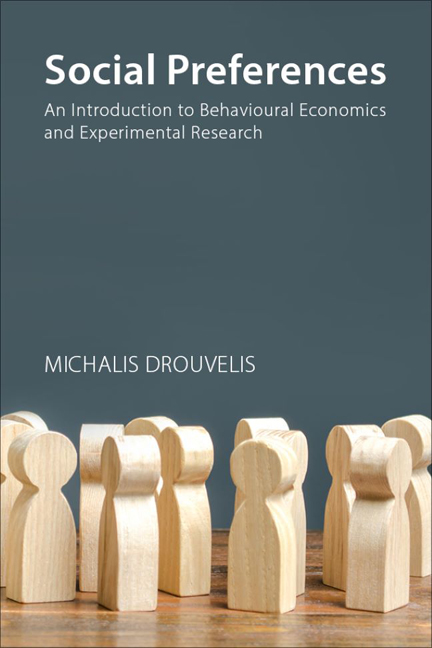Book contents
- Frontmatter
- Contents
- Preface
- 1 Introduction
- 2 Bargaining games
- 3 Trust and gift exchange games
- 4 Public Good Games I
- 5 Public Good Games II
- 6 Leadership
- 7 Public good games with sanctioning I
- 8 Public good games with sanctioning II
- 9 Cross-cultural experiments
- Appendix A Experimental instructions
- Appendix B Practical information
- Notes
- References
- Index
3 - Trust and gift exchange games
Published online by Cambridge University Press: 22 December 2023
- Frontmatter
- Contents
- Preface
- 1 Introduction
- 2 Bargaining games
- 3 Trust and gift exchange games
- 4 Public Good Games I
- 5 Public Good Games II
- 6 Leadership
- 7 Public good games with sanctioning I
- 8 Public good games with sanctioning II
- 9 Cross-cultural experiments
- Appendix A Experimental instructions
- Appendix B Practical information
- Notes
- References
- Index
Summary
Introduction
An important characteristic of our daily behaviour that determines aspects of economic and social interactions is trust. The presence of trust defines the behavioural content of a host of human relationships and has therefore attracted the interest of scholars across different disciplines such as economics, sociology, and political science, to name a few. There a number of definitions that have been put forward in the literature with regards to what trust captures. For example, Gambetta (2000) defines trust as a probability that an individual assigns to another individual performing a certain action. Looking at the sociological value of trust, Luhmann (1979) argues that trust operates in a way such that it reduces complexity in the society and recognizes that individuals’ decision to place trust on others depends on past experience of whether trust was successful (or not) but also on the associated risks related to future decisions. In his 2009 paper, Fehr offers a behavioural definition of trust – based on Coleman's (1990) explanation – according to which the trustor “trusts if she voluntarily places resources at the disposal of another party (the trustee) without any legal commitment from the latter” and points out that trusting someone comes “with an expectation that the act will pay off in terms of the investor's goals”. A key question is: how do we measure trust? Following the behavioural perspective of trust, experimental economists have measured trust using the simple framework put forward by Berg et al. (1995).
The structure of the trust game consists of a sequential game involving two players: the sender and the receiver. The sender (i.e. the first mover) has to decide how much of their experimental endowment – $10 in the Berg et al. (1995) design – to transfer to an anonymous partner, the receiver (i.e. the second mover). The amount of money that the sender transfers to the receiver is tripled by the experimenter. Following this, the receiver has to decide how much out of the tripled account to return to the sender. Any amount of money that the receiver does not transfer back is kept by the receiver.
- Type
- Chapter
- Information
- Social PreferencesAn Introduction to Behavioural Economics and Experimental Research, pp. 31 - 48Publisher: Agenda PublishingPrint publication year: 2021



